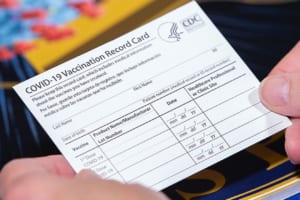A U.S. citizen is eligible to sponsor a spouse to immigrate to the United States as long as certain criteria are met. The type of visa that is issued and the resulting permanent resident status differs based on the length of the marriage at the time that the beneficiary spouse is issued a visa or becomes a Lawful Permanent Resident (“LPR”).
The two visa categories are the Immediate Relative (“IR-1”) visa and the Conditional Resident (“CR-1”) visa. Understanding the distinctions between these two classifications can be important for successfully navigating the immigration process.
IR-1 Visa: Immediate Relative
The IR-1 visa is issued by a U.S. Embassy or Consulate for spouses of U.S. citizens who have been married for more than two years at the time the visa is issued. The IR-1 visa allows the spouse to enter the United States and be granted LPR status immediately. The spouse will be issued a Form I-551 resident card (“green card”) valid for 10 years.
CR-1 Visa: Conditional Resident
In contrast, the CR-1 visa is issued to spouses of U.S. citizens who have been married for less than two years when the immigrant visa is issued. Upon entry into the U.S., the spouse is granted Conditional Permanent Resident (“CPR”) status. Although the spouse is officially a conditional lawful permanent resident, they are still recognized as LPRs with all the rights and privileges of all other LPRs, but with certain special conditions tied to their status.
Removal of the Condition on Resident Status
The CPR spouse receives a green card valid for 2 years. During the 90-period before the 2-year anniversary of obtaining CPR status, the spouse must file a Form I-751 Petition to Remove Conditions on Residence. At that time, the U.S. citizen and the spouse may be required to prove that the marriage is bona fide, entered into in good faith and not solely for immigration benefits, and the couple continues to live as a married couple. There are some exceptions for marriages that may end in divorce or in which abuse has occurred.
The Form I-751 petition is filed with the United States Citizenship and Immigration Services (“USCIS”) in the United States. Unfortunately, at the time of this article, it can take several years for USCIS to adjudicate and approve these I-751 petitions. During that time the spouse’s green card will be extended by the receipt notice of the I-751 petition while waiting for the approval.
A key factor in whether the spouse is granted LPR status or CPR status is the length of marriage at the time the spouse is granted resident status. If the spouse is outside the U.S. and enters with an immigrant visa, and the couple has been married over 2 years, the spouse will be granted LPR status, even if they have a CR-1 visa. The same applies if the spouse is in the United States and an application for adjustment of status is approved after 2 years of marriage.
Timing to enter the U.S. can be important if a spouse is issued a CR-1 visa. The visa will be valid for about 6 months and the spouse will have that period of time to enter the United States. If the 2 year anniversary of the marriage occurs during these 6 months, the spouse can consider delaying their entry until 2 years have passed so that they can enter the U.S. and be granted LPR status, thus avoiding the time, hassle and cost of having to file the I-751 petition.
An additional strategy may be to delay the spouse’s immigrant visa interview so the immigrant visa can be issued later to ensure that 2 years of marriage has passed.
How Conditional Residency is Determined
I short, the determination of whether a spouse qualifies for LPR or CPR hinges on the length of the marriage at the time the spouse obtains permanent resident status.
- If the marriage has lasted more than two years, the applicant is granted LPR.
- If the marriage has lasted less than two years, the applicant is granted CPR.
For more information, contact us at info@enterlinepartners.com.
ENTERLINE & PARTNERS CONSULTING
Ho Chi Minh City, Vietnam Office
146C7 Nguyen Van Huong St, Thao Dien Ward,
District 2, Thu Duc City
Ho Chi Minh City, Vietnam
Tel: +84 933 301 488
Email: info@enterlinepartners.com
Facebook: Enterline & Partners – Dịch vụ Thị thực và Định cư Hoa Kỳ
YouTube: @EnterlineAndPartnersConsulting
Website: http://enterlinepartners.com
Manila, Philippines Office
LKG Tower 37th Floor
6801 Ayala Avenue
Makati City, Philippines 1226
Tel: +63 917 543 7926
Email: info@enterlinepartners.com
Facebook: Enterline and Partners Philippines
Website: https://enterlinepartners.com/language/en/welcome/
Copyright 2024. This article is for information purposes only and does not constitute legal advice. This article may be changed with or without notice. The opinions expressed in this article are those of Enterline and Partners only.








